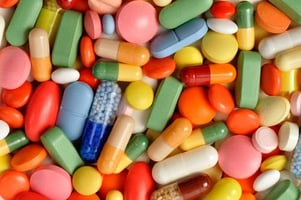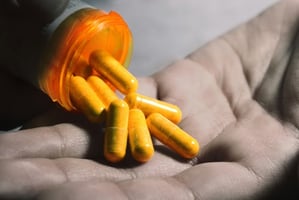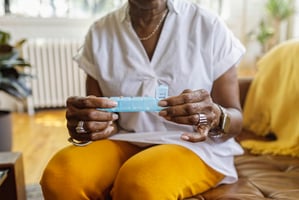Patient Expectations of Antidepressants May Mediate Placebo Effects
 |
To examine the relationship between patient expectancy and placebo effects, Bret Rutherford, M.D., of Columbia University College of Physicians and Surgeons and colleagues enrolled 54 patients with major depressive disorder (aged 24 to 65) in an eight-week citalopram trial. Before being randomly assigned to the placebo-controlled or open group, participants were asked questions to assess how much they believed depression symptoms would improve by the end of the trial.
In an effort to manipulate patient expectancy, the participants were informed of their group assignment before starting medication but instructed to refrain from revealing this assignment to anyone in the study group. Expectancy of treatment outcome was then measured once again before patients began taking citalopram (20 mg/day) or pill placebo for eight weeks.
Participants were assessed using the Hamilton Rating Scale for Depression (HAM-D) throughout the trial. Treatment response was defined as decrease of 50% or more from the baseline HAM-D score; patients who had a HAM-D score of 7 or less at week 8 were considered to be in remission.
Although mean prerandomization expectancy scores did not differ significantly between the open group (mean=11.2 [SD=1.1]) and placebo-controlled group (10.8 [SD=1.9]), postrandomization expectancy scores were significantly higher in the open group (mean=12.1 [SD=2.1]) compared with the placebo-controlled group (mean=11.0 [SD=2.0]), when adjusted for baseline HAM-D scores. This, according to the authors, suggests “the experimental design succeeded in manipulating expectancies.”
The authors found that response rates were 25% for placebo-controlled placebo, 45% for placebo-controlled citalopram, and 53.8% for open citalopram. Remission rates were 0% for placebo-controlled placebo, 20% for placebo-controlled citalopram, and 34.6% for open citalopram. After adjusting for covariates, the average participant treated with citalopram in the open group experienced 6.2 points of additional improvement in HAM-D score by week 8 compared with the average participant treated with citalopram in the placebo-controlled group.
“Strikingly, despite receiving the identical antidepressant medication, being treated by the same study clinicians, and visiting the same treatment site, depressed subjects who knew they were receiving citalopram improved on average 6 HAM-D points more than those receiving citalopram who were aware they had a chance of receiving placebo,” the authors wrote.
“To the extent that expectancy mediates placebo responses in antidepressant studies, limiting patient expectancy may be a useful strategy to reduce placebo response in phase III trials. ... Conversely, the optimal strategy in clinical practice may be to combine active medication with a presentation that enhances patient expectancy, leading to greater medication response,” they concluded.
For related information, see the Psychiatric News PsychoPharm article “Unraveling the Mystery Behindthe Nocebo Effect: Placebo’s Evil Twin.”





